


Key Stage 3
CURRICULUM GUIDE
2025-26








2025-26




This guide contains descriptions of the courses we offer to pupils in the first three years (Year 7 - Year 9; Key Stage 3) of their secondary school education at The British School of Paris. These have been written by the Heads of Faculty who, together with their colleagues, have designed and developed BSP courses that are in line with teaching in the UK.
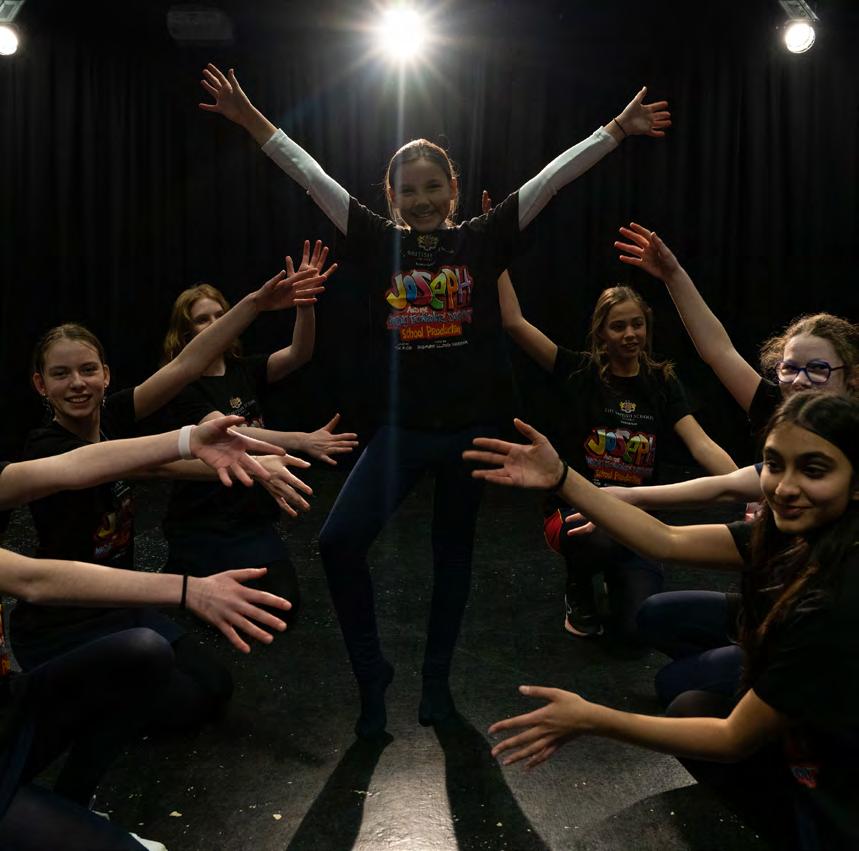
We offer a broad and rigorous programme of subjects and provide a balanced coverage of the humanities, arts and sciences, expressive arts and physical education, ensuring that pupils are exposed to a wide range of skills and techniques, as well as experiencing opportunities to develop their creativity and well-being.
The subjects offered at the BSP at Key Stage 3 are: English, Mathematics, Science, French, Spanish, German, Geography, History, Design and Technology, Computing, Art, Music, Physical Education (PE) and Personal, Social, Health and Economic Education (PSHE). We also offer options in the form of German, Spanish and support as required, for example English as an Additional Language, Curriculum Support Literacy, or Curriculum Support Numeracy.
Each pupil is assigned to a tutor group where academic and social development is closely monitored and recorded. The tutor and Head of Year liaise with pupils, subject teachers and parents, and the tutor should be the first port of call if academic or pastoral matters need attention. Each year, our assessment process will allow you to follow your child’s progress and pupils receive regular feedback on their own performance. At these times, with help and guidance from parents and their tutor, pupils are encouraged to set realistic targets for their future performance, as well as to think of ways in which to achieve them.
A pupil’s experience in Key Stage 3 is not just about academic opportunity and success. All our pupils enjoy a wide variety of activities as part of their school timetable. The programme varies from term to term but typically involves drama, music, sport, creative opportunities and an impressive range of other activities. Pupils are also encouraged to take positions of responsibility within their peer groups and may represent their year group at Student Council. Our strong Community and Service focus encourages pupils to participate in many activities to raise money for charities and to learn the importance of helping to serve the wider community. In the summer term, all pupils in Years 7 –9 enjoy a week of learning away from school to benefit from an exciting outdoor education programme taught by experts. Activities build upon the skills acquired in the classroom and offer experiences such as rock climbing, orienteering, sailing and mountain biking. We organise activities and visits to enhance learning throughout the year. History, Geography, French, Mathematics, Art and Science: nearly every area of the curriculum will, at some point, extend beyond the classroom to put learning into the context of the world at large. We hope that you will find this booklet helpful and interesting. If you would like further information, please do not hesitate to contact us.
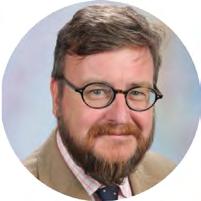
Mr Hammond – Headmaster

Art at KS3 is designed to teach pupils the fundamentals of drawing, painting, printmaking and sculpture in an environment that encourages curiosity, creative problem-solving and fun.
• That pupils look more carefully at the world around them through observational drawing.
• That pupils explore new techniques and materials and refine their use of these.
• That pupils evaluate and analyse their own and others’ work using subject-specific keywords.
• That pupils demonstrate the ability to work independently and solve problems in a creative way.
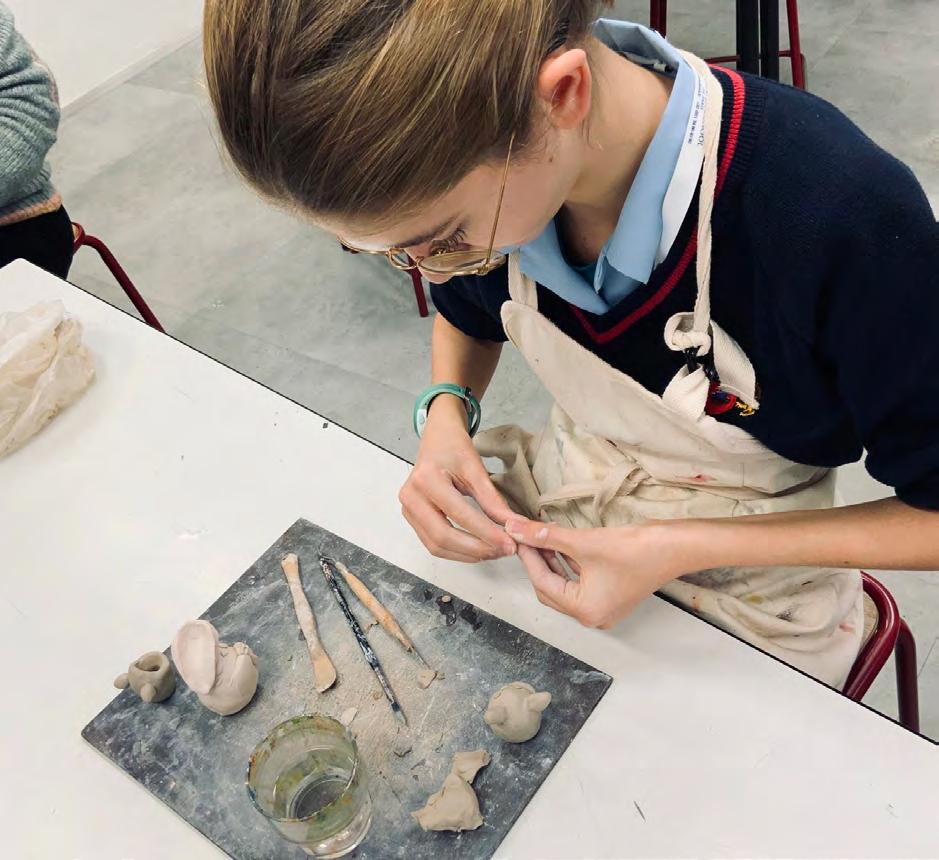

Drawing in all its forms is at the core of every project. Pupils are introduced to the formal elements in Year 7, learning the basics of working with line, tone, shape and colour. They will then extend these skills as they progress through Years 8 and 9, while exploring new techniques and materials, such as ceramics, printmaking and digital media.
Pupils will learn to look at, describe and analyse the work of other artists linked to their project themes, gradually building up more complex vocabulary and subject specific language.
Pupils are assessed against the learning log at each internal assessment period. Pupils will not be required to sit internal exams in Art at KS3.
Pupils are set weekly homework tasks to extend or consolidate work done in lessons, in line with the homework policy. Longer tasks may be set over a two-week period.
Pupils are expected to bring the following equipment to every lesson:
• Pencils - ideally HB and 2B
• Sharpener
• Black biro or fine line pen
• Rubber
• Glue stick
• Scissors
• Colouring pencils
• iPad
Weekly clubs for Art and Photography provide budding artists with the opportunity to take part in fun projects and try materials and techniques usually reserved for older students. Pupils are encouraged to enter international and school-wide art and photography competitions each year.
Pupils’ work is exhibited throughout the school and forms part of the art building’s permanent exhibition of work.

In Computing at Key Stage 3, pupils are taught to use computer resources effectively and independently. They are given the tools to learn and demonstrate practical competence in Digital Literacy, Information Communication Technology and Programming. Digital Literacy will give the pupils an opportunity to develop their understanding of the Internet and Worldwide Web.
They will learn how to be a responsible digital citizen and will develop sound knowledge of e-safety and some of the issues involved in the Digital Age. Information Communication Technology is the discipline of using software as a tool. Pupils will learn how to use graphic packages to manipulate and create graphics. Pupils will use a wide variety of software applications to create websites, animations and podcasts to promote events in a given scenario. In the Computing section of the KS3 curriculum, pupils attempt to code and create their own technology.
Coding, in the simplest of terms, is telling a computer what you want it to do, which involves typing in step-by-step commands for the computer to follow using the correct syntax. Through coding pupils are able to build, for example, graphical and text-based adventure games. They will learn to use programs such as Flowol to understand sequences and sub-routines.
As they develop their understanding of programming they will use a text-based programming language called Python and learn the difference between a complier and interpreter.
YEAR 7
• Getting started
• Make code programming a game
• Bebras Challenge
• PPT skills
• Using blogging to gain support for a cause
• Excel skills
YEAR 8
• Getting started
• Introduction to Python
• Bebras Challenge
• Data representation
• HTML
• Excel skills
YEAR 9
• Understanding a computer
• Networks
• Python - next steps
• Programming/Robotics - Drones

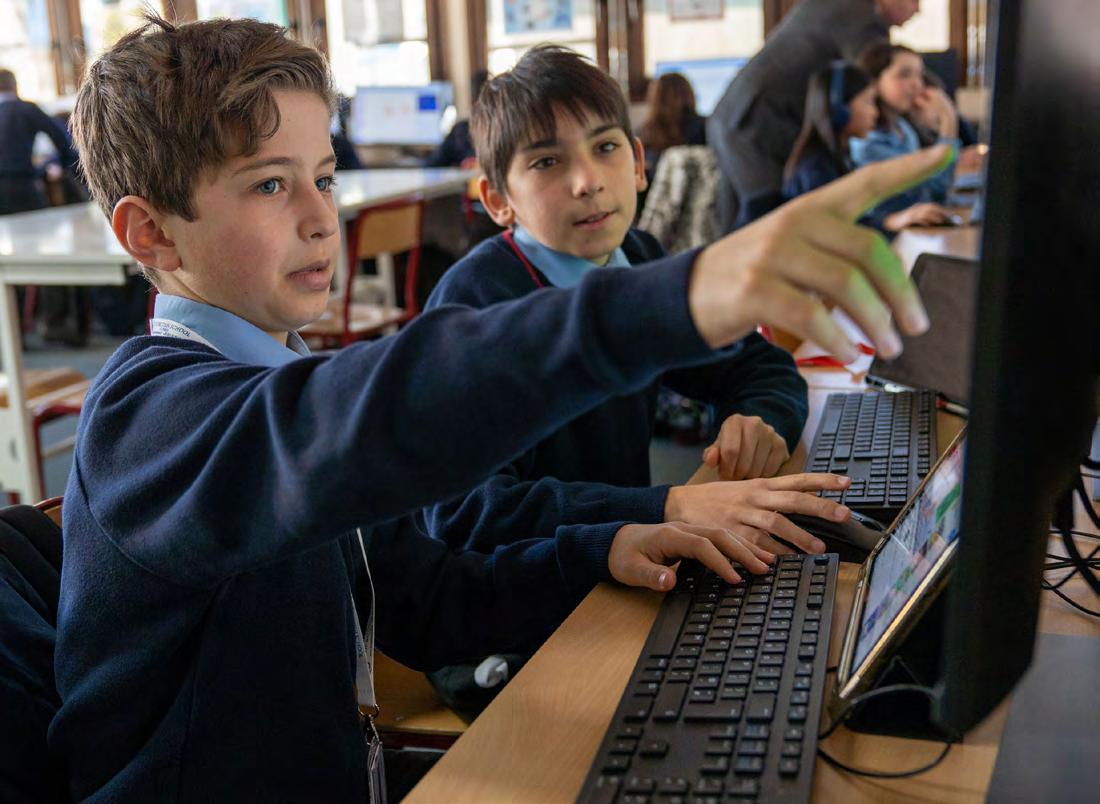

The British School of Paris aims to provide an environment where all pupils are able to realise their full potential. The most important role of the Learning Support Department is to help the pupils to achieve this.
Literacy and Numeracy are separate intervention classes offered to KS3 pupils. Lessons occur at the same time as German, Spanish and EAL classes. There are separate Year 7, Year 8 and Year 9 groups.
The Literacy and Numeracy provisions aim to give extra support to pupils who, irrespective of ability, benefit from studying one less foreign language. Children who join these small intervention groups may have been identified as underachieving in respect to certain core elements of the English and Mathematics curriculum and/or as a pupil who could benefit from some ‘booster lessons’.
Recommendation for entry into the Literacy or Numeracy group is made on the results of end and start of year screening tests as well as the ongoing advice of teachers and parents/guardians. In consultation with parents/guardians, learners may enter and leave these groups during the year depending on progress.
The Literacy class aims to boost the reading, spelling and overall writing skills of pupils. Correspondingly, the Numeracy class targets children with mathematical difficulties and aims to help them meet challenges in respect to arithmetic, geometry and mental calculations. Both programmes are designed to motivate and develop the confidence of learners.
Curriculum Support is a timetabled option and is not an additional educational service. Therefore, there are no extra fees levied for these classes.
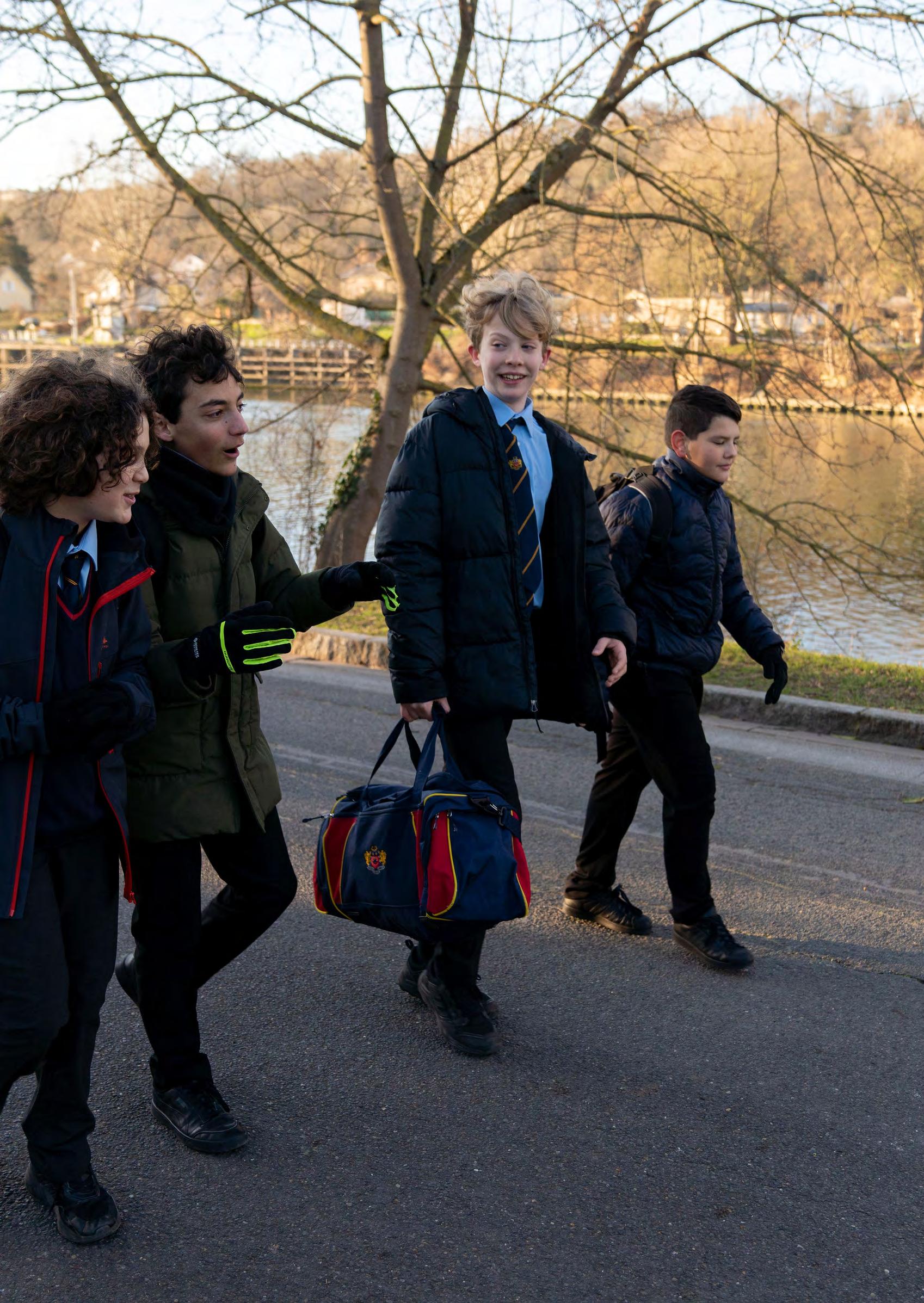

“The best way to predict the future is to create it.”
The above quote is closely linked to the aims and objectives of Design & Technology at Key Stage 3. As the world continues to change at a rapid rate, tomorrow’s work force must be prepared for jobs that do not currently even exist! For this, pupils need to learn independently and think creatively in order to quickly and successfully adapt to their given situation. This ability to innovate, along with a focus on graphic communication, quality of manufacture and computer-aided design are the primary drivers of the Design & Technology curriculum at The British School of Paris.
In Year 7, pupils engage in project-based learning activities where, both in groups and individually and often in the form of live project briefs, they are challenged to generate solutions. Skill-specific workshops equip them with the practical resources and processes required to tackle such problems.
Examples of the projects previously tackled include designing a range of products to sell at the Christmas Fair, a series of mini-tasks concerned with developing individual Superhero identities and group STEM projects including; bridgebuilding, the egg-drop challenge and a marble run.
Beyond Year 7, pupils continue in a similar vein, identifying needs and drawing on knowledge and understanding from a wide range of subject areas to generate ideas to satisfy predetermined project briefs.
Pupils will develop their affinity for conducting effective research before applying the lessons learnt within their own design processes; much in the same way as any designer would in a professional setting.
Throughout Years 8 and 9, pupils will be involved in a number of DMTs (Design and Make Tasks); each focusing on a different aspect of Product Design; providing a natural link and foundation to the GCSE and A Level Product Design courses offered.
The DMTs provide a focus for our studies, ensuring that within every specialist area, the pupil will be involved in making. Pupils are encouraged to develop their practical skills and emphasis is placed on not just the quality of the finished product, but also the process by which the pupil generates that particular solution.
Pupil assessment is explicitly linked to departmental ‘I can’ statements. This transparent skill-based assessment procedure means that pupils are able to clearly identify their working levels across the whole of Key Stage 3.
The following pieces of equipment are essential within Design & Technology lessons. Some extra pieces of equipment have also been listed; although not essential, these would help give pupils a higher level of quality in certain areas of the design process.
ESSENTIAL:
• Propelling pencil with 0.5mm HB leads and metal sleeve, or HB pencil and eraser
• 200mm rule or larger
• Colouring pencils
DESIRABLE:
• Set of black fineliners
COMPUTER SOFTWARE:
The following programs are regularly used within lessons. If pupils are able to download these at home, it can often prove useful to continue developing certain CAD skills.
• SketchUp
• Adobe Photoshop & Illustrator

Year 7
Year 8 3D modelling
Project Based Learning – Various Projects Christmas Fair, Superheroes, Garden Party, STEM Challenges
Biplane CAD Art Deco coasters Electronic circuits Pianos Cushions Year 9
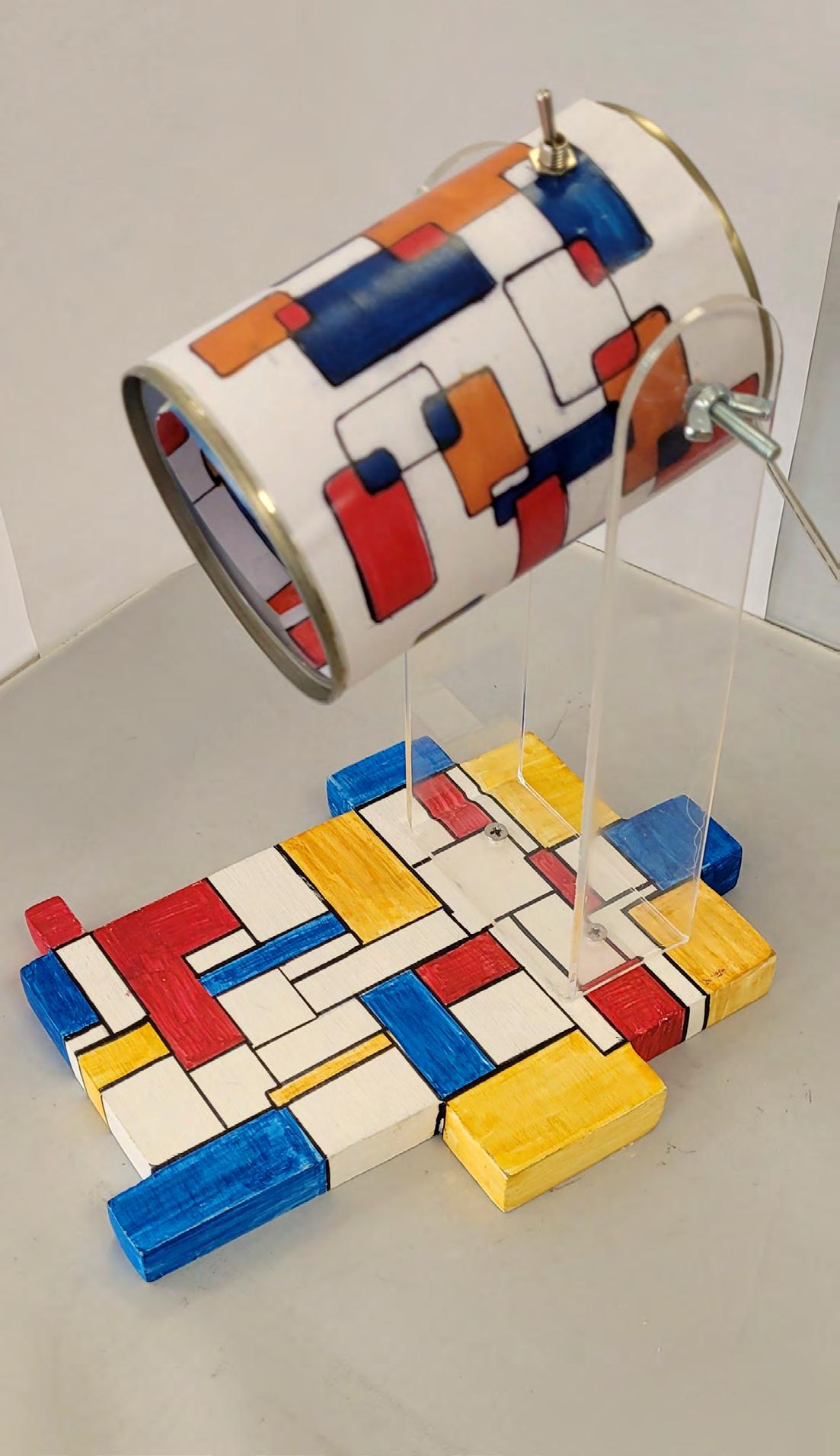
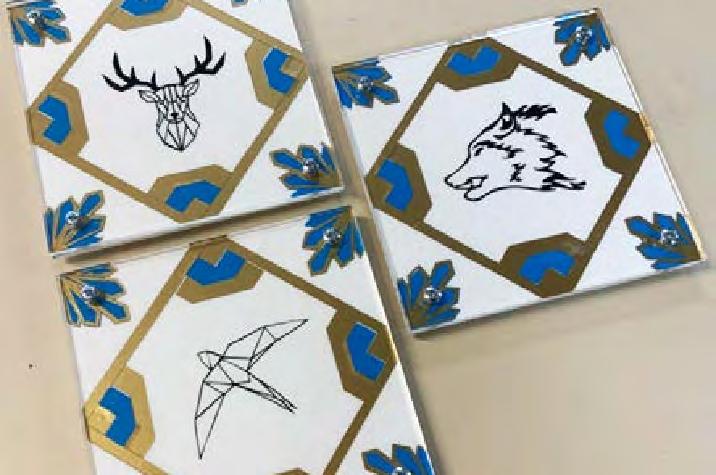
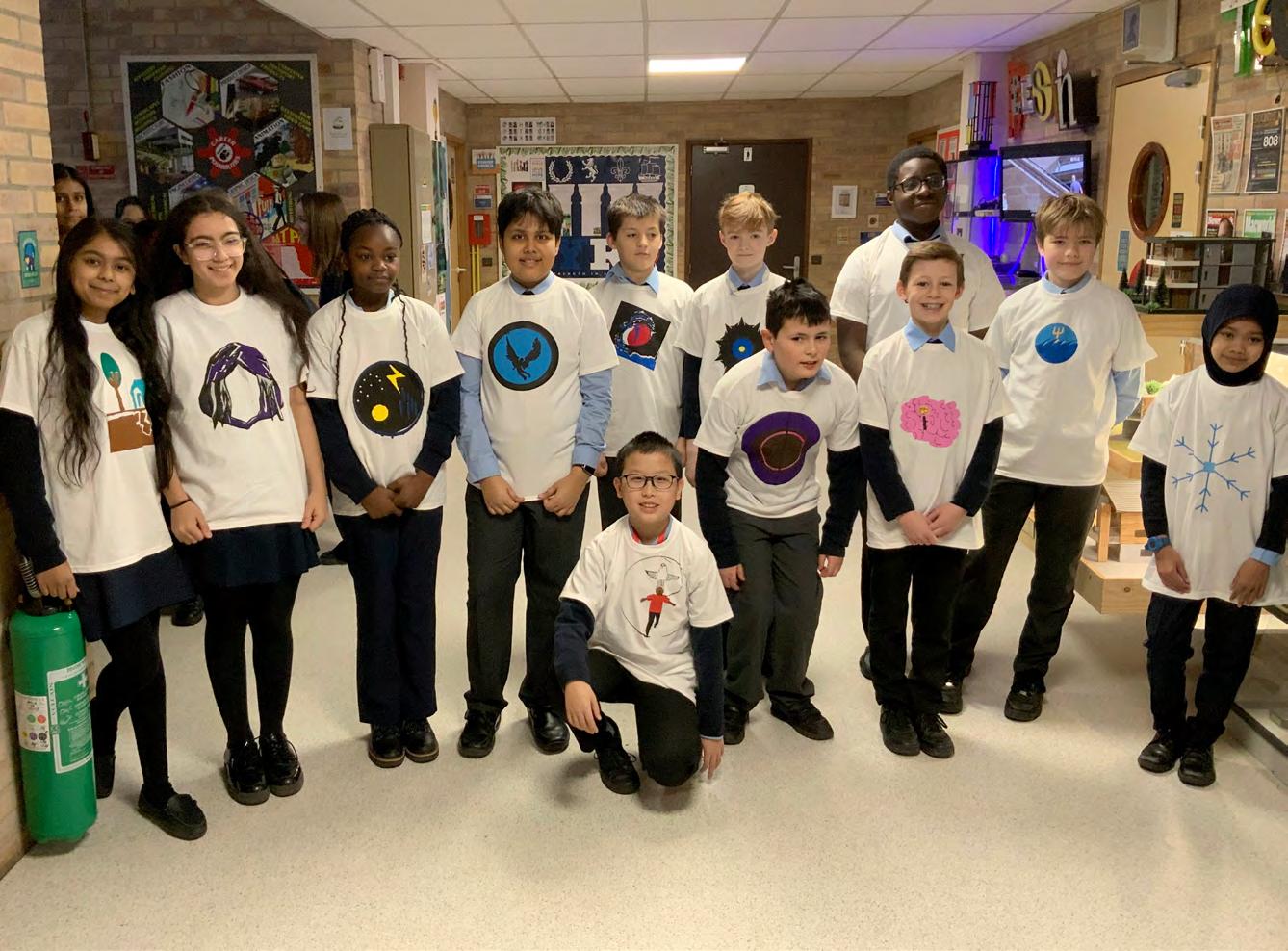

Key Stage 3 Teaching and Learning in English is based on the following ethos:
All pupils are encouraged to:
• Enjoy English
• Be enthusiastic about English
• Develop the confidence necessary to rise to challenges in English
• Read a wide range of texts in class and independently, including poetry, drama, nonfiction and pre-twentieth century works
• Write accurately and creatively for a range of purposes and audiences
• Consolidate and build on their knowledge of Standard English grammar and vocabulary
• Speak confidently and effectively in debate, drama, and individual presentations
• Develop their knowledge of English-language culture.
• All classes in all years cover a range of appropriate fiction, poetry, drama, and non-fiction texts in lessons.
• Pupils are expected to keep an independent reading journal on their iPad.
• Classes have the opportunity to make good use of the Library on a regular basis.
All classes in all years learn to write for a range of purposes and audiences, using a variety of formats. Spelling, punctuation, and grammar are taught and assessed, in addition to language techniques. Modelling and scaffolding of tasks is offered when appropriate, either for the individual or the class.
Pupils are expected to act on feedback given in order to improve and progress (for example, learning their spelling corrections).
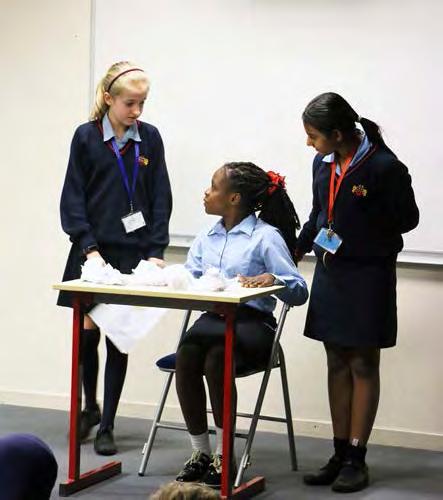
The English classroom provides ample opportunity for pupils to express themselves orally. Tasks may range from individual formal presentations to informal group discussion, formal debate and text-based role-play.
Drama is an integral part of the syllabus. Shakespeare is initially introduced in Year 7 and an entire play is studied in Year 9. In Year 8, Drama focuses on a modern playwright.
Pupils benefit from access to the Drama Studio and Braille Multi-Purpose Room, where activities also include improvised and devised work.
Pupils in Year 7 are taught in form groups; pupils in Years 8 and 9 are grouped according to ability. In all three years, there is a fourth, smaller class for pupils who might find it difficult to access the mainstream curriculum.
Pupils may use their iPad in all aspects of English work, from research and planning, writing and redrafting to filming.

English as an Additional Language (EAL) classes are offered to any pupils whose first language is not English or whose previous schooling was not within an English-speaking environment.
Following a placement test, it will be decided whether EAL is suitable for the pupil, although any pupil who feels he/she would benefit from extra English language instruction is welcome to join. A lowerintermediate level is required as a minimum.
Within the school timetable, EAL replaces an additional language (usually German or Spanish). Nevertheless, pupils will continue to study French.
However, pupils with a level below lower- intermediate would usually not have enough English to cope in mainstream and may be withdrawn from one or more mainstream subjects. They follow a tailor-made language programme designed to build their reading, writing, listening and speaking skills, therefore. EAL teachers coordinate with mainstream teachers in order to provide extra support to pupils. When a satisfactory level of English has been attained, pupils will reintegrate into all mainstream lessons.
EAL pupils are taught in small groups and the level of instruction is adjusted to suit each pupil’s needs. Emphasis is given to all four language skills - listening, reading, speaking and writing - to provide the pupils with sufficient English for their needs in the Senior School.
The course is very much centred around English language learning using the mainstream curriculum as context, while giving pupils the skills needed to access the wholeschool curriculum as well as using English naturally. The small group sizes give pupils plenty of opportunities to work in pairs and for peer and self-assessment. Pupils also focus on subject specific vocabulary.
EAL pupils are set homework once a week, or more if they are withdrawn from a mainstream subject. This may take the form of reading comprehension, preparation for a presentation, essay writing or research. They will be continuously assessed throughout the year.
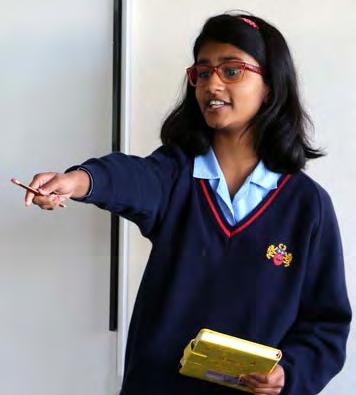
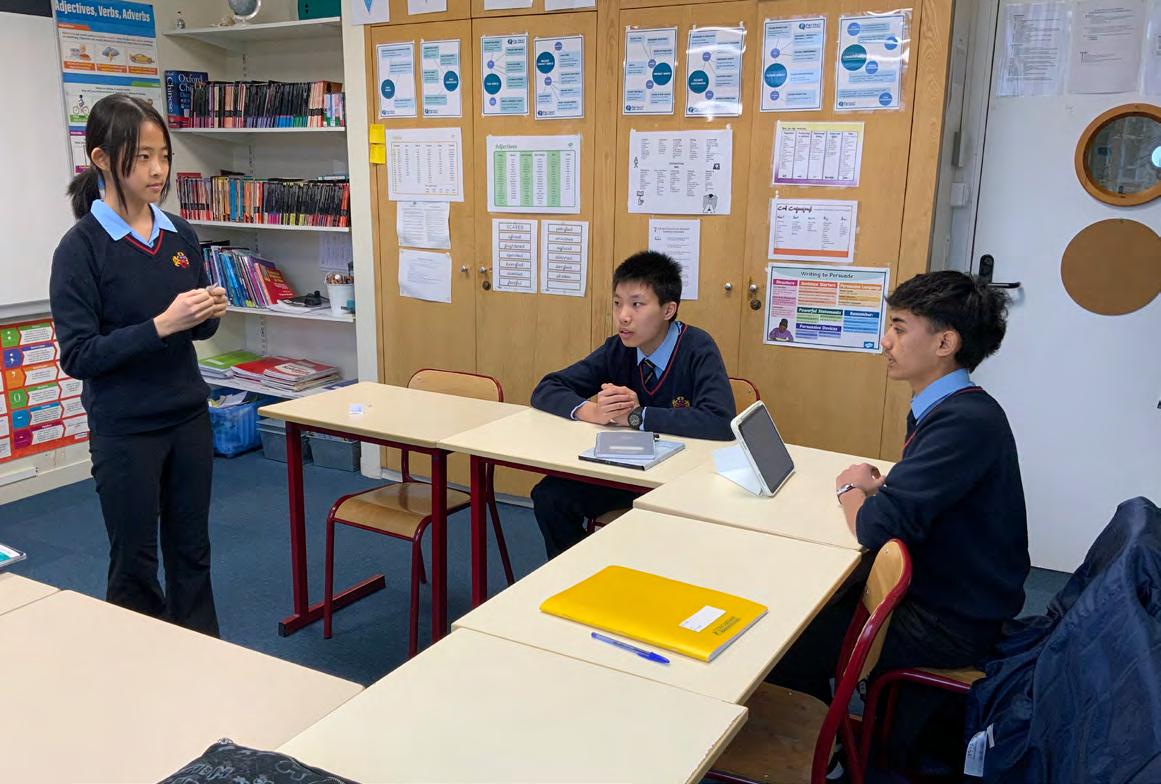

The study of Geography inspires curiosity of places, people, resources and environments. Geography offers pupils the knowledge and skill to enhance their role as caring, proactive global citizens.
Pupils measure places, people, resources and natural and human environments, especially the interactions between them. Inspiring field trips explore the relationships between people, their living spaces and their natural environment. As Geographers, pupils debate using evidence, making sense of the potentially confusing world rising above media hype, populism and political spin. Pupils investigate what our planet has to offer, valuing their role as economic, social, and environmental stewards.
• To analyse, interpret and evaluate physical and human interactions.
• To identify physical and human characteristics and processes in globally significant places.
• To understand the relationships between them in order to gain an appreciation of how these can change over time and between different places.
• To use geographical skills to collect, analyse and communicate a range of data from the classroom and fieldwork, thereby deepening this understanding.
• To interpret a range of sources of geographical information, including maps, diagrams, globes, aerial photographs and Geographical Information Systems (GIS).
• To communicate geographical information in a variety of ways, including through presentations, maps, numerical and quantitative skills and writing at length.
• To get to know the physical and human features in all regions of the world. Pupils will understand how geographical processes interact to create distinctive human and physical landscapes. They are able to measure how these change over time. They apply science, statistical models and theories to interpret their own data from field trips, thus enriching their appreciation of their perspective on a complex world.
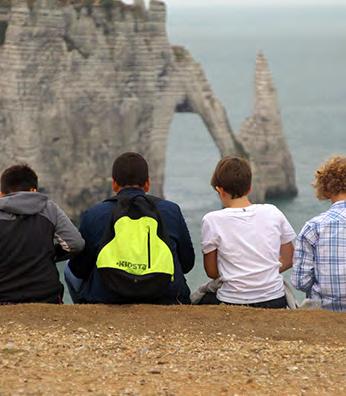
Over the course of each topic, pupils build a world map to locate each idea learned. Over the year, the interactions and interrelationships between physical and human geography become clear. This map supports pupils’ spatial understanding of the world, but increasingly becomes a platform for analysis, debate and creative ideas.
Pupils understand geographical processes and express their understanding using case studies in a variety of places. Human processes consider population; urbanisation; international development; economic activity in the primary, secondary, tertiary and quaternary sectors; and use of natural resources. Physical processes consider geological timescales and plate tectonics; rocks, weathering and soils; weather and climate; climate change from the Ice Age to the present; glaciation, hydrology and coasts. When investigating how these processes interact to influence landscapes, environments and the climate, pupils evaluate to what extent human activity relies upon these physical systems.

Use of globes, maps, atlases and digital simulations is routine. Pupils interpret Ordnance Survey maps in the classroom and the field, using grid references and scale, topographical and other thematic maps, and aerial and satellite photographs. Information technology has advanced in the Geography classroom meaning pupils also view, analyse and interpret places and data using Geographical Information Systems (GIS). These skills are enriched by carrying out fieldwork in contrasting locations to collect, analyse and draw conclusions from geographical data, using multiple sources of information. Teamwork and solving problems with others are key to success in Geography.
YEAR 7 TOPICS
• Magical Maps
• Weather
• Population
• Rivers and floods
• Volcanoes and Earthquakes
• Climate Investigation
YEAR 8 TOPICS
• Coasts
• Earth’s resources
• Ecosystems
• Urbanisation
• Antarctica
• Climate Collage
YEAR 9 TOPICS
• Climate change
• Crime and conflict
• Development
• Globalisation
• Glaciation
• Physical Landscapes
The British School of Paris, with over 50 nationalities represented, offers a rich and diverse environment. Our curriculum reflects this through a broad mix of six physical and human Geography topics every year, each with their associated case studies and skill sets. As a small community of well-informed global citizens, it is our responsibility to explore our exciting planet and show our gratitude by actively improving it for future generations. At KS3, fieldwork opportunities include a local climate investigation, a coastal investigation on the Normandy coast and a crime investigation in Croissysur-Seine. Workshops are carried out for Switch-Off Fortnight, Fairtrade Fortnight and Environment Week and guest speakers are invited to speak on specialist topics. Students also compete in the BSP Worldwide Geography Challenge and Royal Geographical Society Challenges.
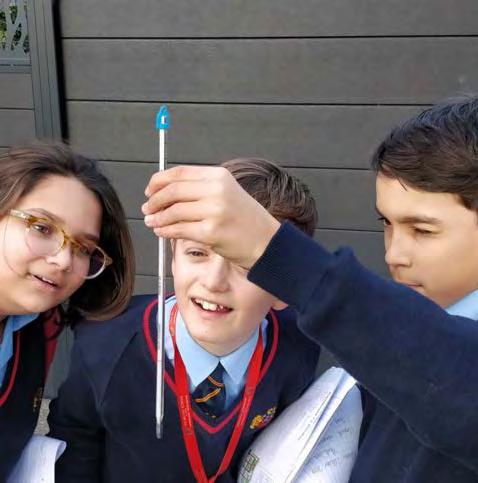
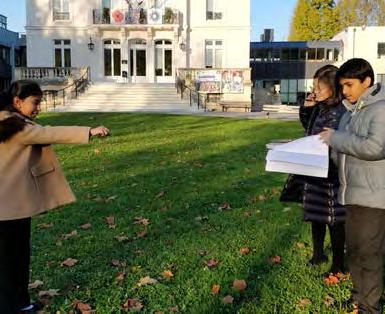

History is the past and the study of the past
The two main aims or purposes of school History are:
• to help pupils develop a sense of identity through learning about the development of Britain, Europe and the world.
• to introduce pupils to what is involved in understanding and interpreting the past.
There are a number of other purposes:
• to arouse interest in the past.
• to contribute to pupils’ knowledge and understanding of other countries and cultures.
• to understand the present in the light of the past.
• to enrich other areas of the curriculum.
• to train the mind by disciplined study.
• to prepare pupils for adult life.
There is a strong sense of why History is being taught throughout the course.
There are three attainment targets in the teaching of History.
This attainment target is concerned with the setting of historical information. History is fundamentally about understanding events over time and in a chronological structure. The concepts of change and continuity and of cause and effect are related to the chronological structure of history.
Marking schemes assess pupils’ understanding of these concepts. Pupils should not gain the impression that history represents a continuous line of progress; they should discover that human affairs have developed at different speeds in different places and they have frequently zig-zagged or regressed. The concept of cause will help pupils to understand why things happened, what motivated people to act as they did and what were the effects. Pupils will come to understand that these concepts are useful but also have their limitations.
As pupils acquire historical information and understanding so the foundation for developing historical skills grows firmer. As knowledge accumulates and becomes more complex so the skills of critical and objective analysis, the ability to form and test hypotheses, the ability to use the imagination in a disciplined way, and the capacity to read and to listen critically and comparatively, all become more important and increasingly refined.
Pupils should therefore progress in their ability to gauge the relative reliability and usefulness of a wide range of sources of evidence in seeking historical explanations. This attainment target is concerned with the ways in which pupils become involved in history as a process of discovery.
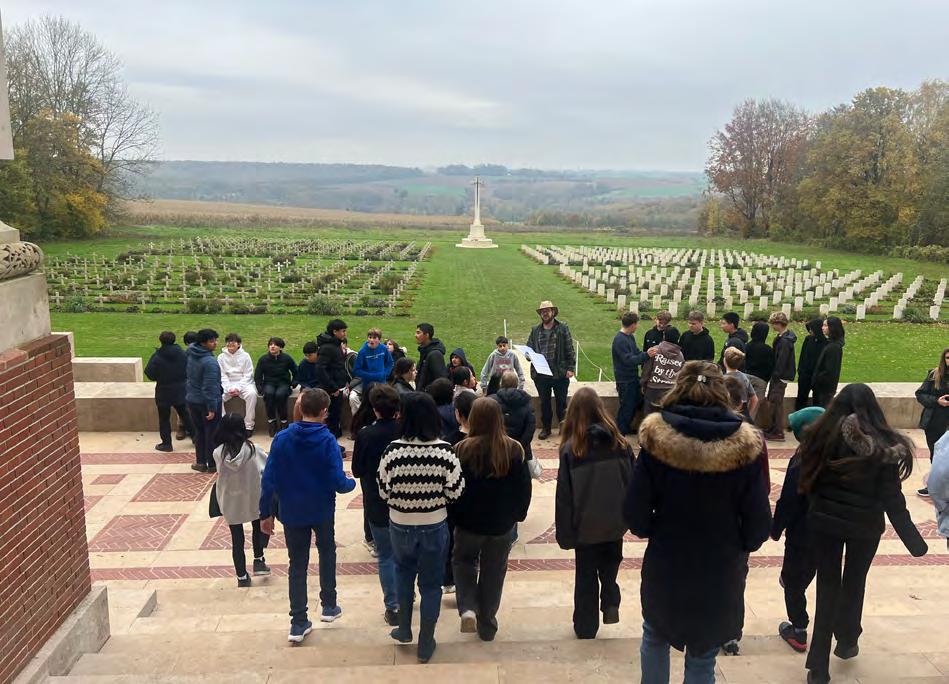
Historical information will remain inert unless it is gathered, processed and ultimately communicated in logical and systematic ways. History, as a set of processes, is concerned with the inter-relationship between the planning of an investigation, refining ideas and organising and communicating findings based on historical evidence. This attainment target is concerned with all these processes and with bringing them together in a coherent presentation which can take a variety of forms including written narrative, formal reasoned explanation, discussion and argument or dramatic reconstruction. Communication in history requires concepts specific to the area of study, and this attainment target measures the mastery of such concepts.

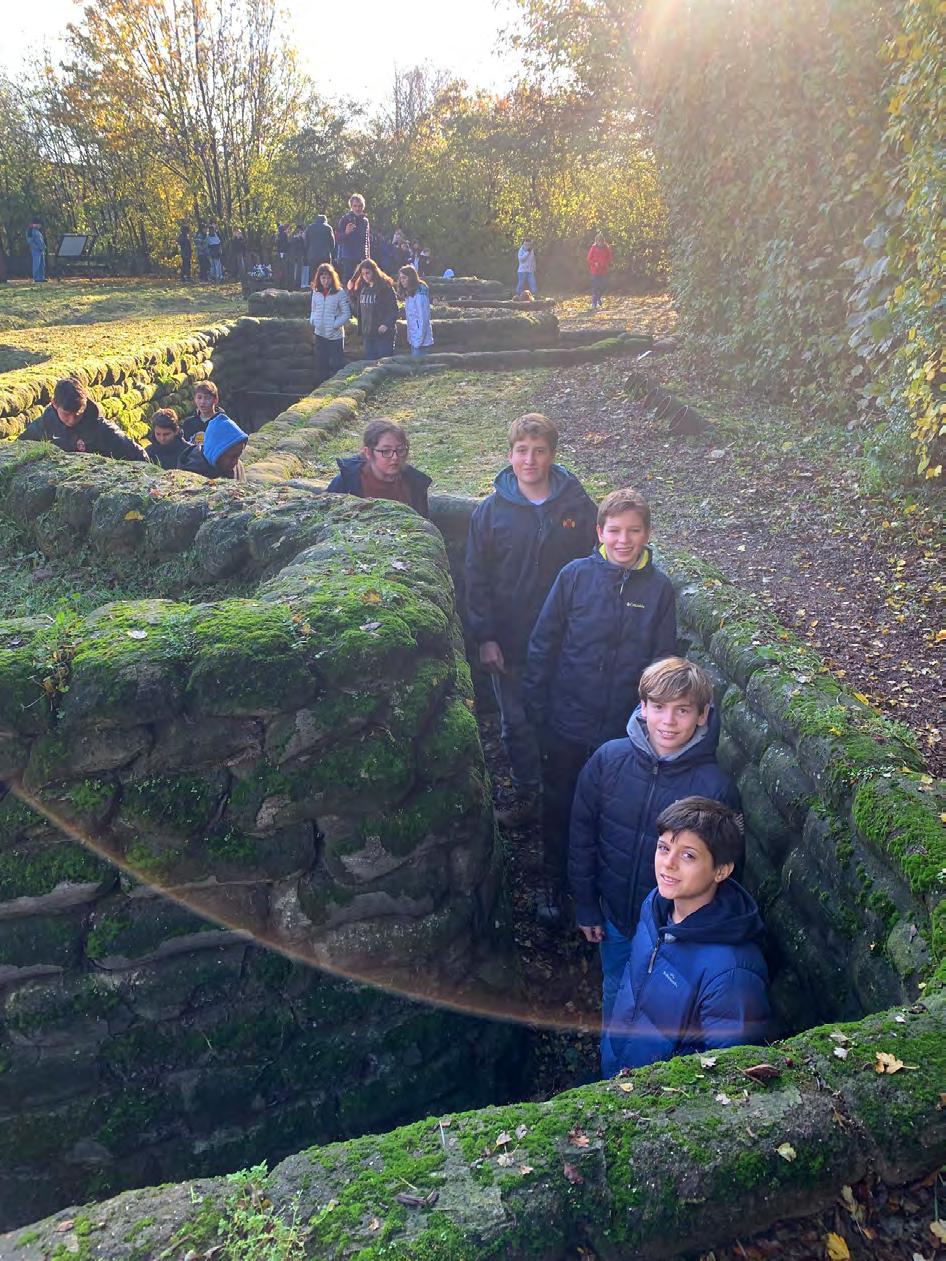
At the beginning of Year 7 all pupils are given a short introductory course which is designed to make them aware of the nature of the subject. This course invites them to think critically about the assumptions that lie behind any chronological survey and begins to teach them the skills that they will find necessary throughout their secondary education.
Once this has been completed, Year 7 pupils begin their first Study unit - the Roman Empire. This is followed during the Spring and Summer terms by Islamic Civilisations and finally Medieval Realms. In Year 8 the pupils study The Making of the UK, 1500-1680, Empire, Native Americans and the Civil Rights Movement. They progress in Year 9 to study both World War
YEAR 7 HISTORY
• Skills in History
• The Roman Empire
• Islamic Civilisations
• The Medieval Realms
YEAR 8 HISTORY
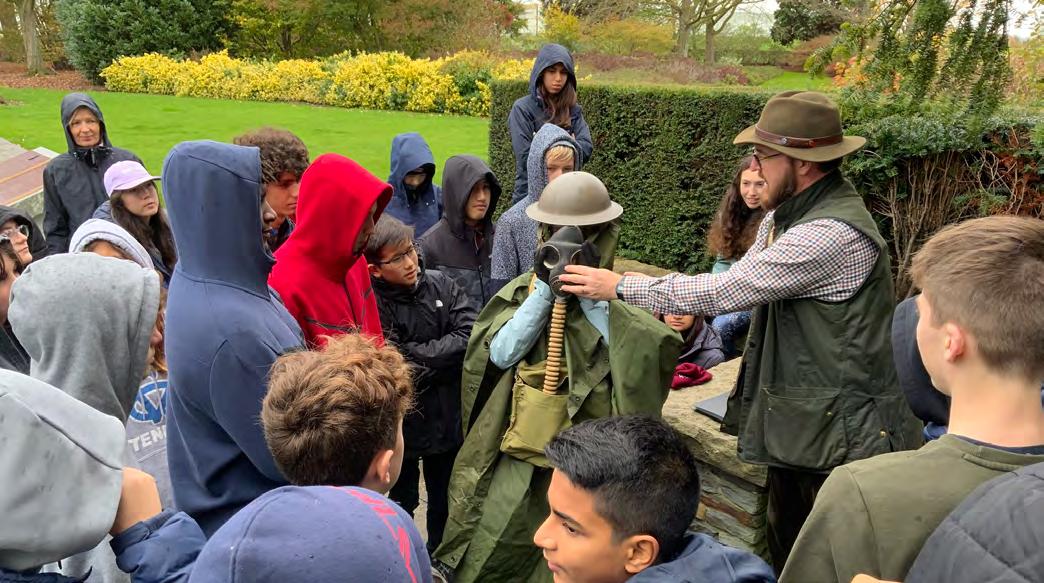
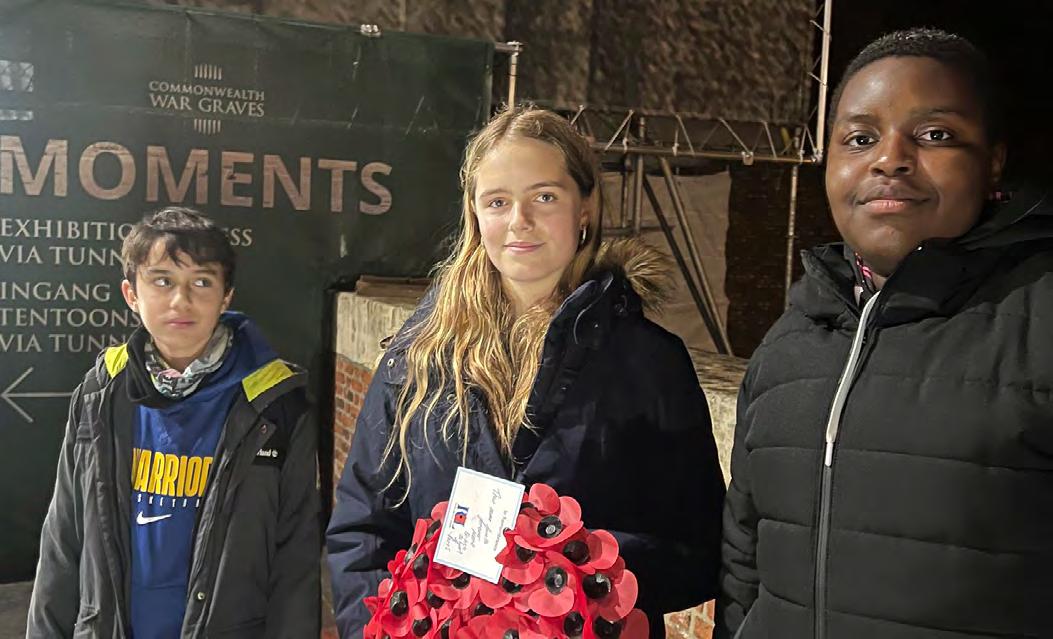
One and World War Two, to understand the Holocaust and Modern Genocide and to complete an individual study on South Africa and the Rainbow Nation. They end their Key Stage 3 History studies with an in-depth examination of the First World War era and an overview of 20th Century history.
It is obviously not possible to give more than a general survey of these centuries, given the time available.
The teaching seeks to strike a balance between establishing general trends and examining particular events and social structures in detail. Emphasis is always given to distinguishing the importance of chronology, evidence and empathy as well as the role of the individual.
YEAR 9 HISTORY
• England 1500-1680
• Empire
• Native Americans
• The Civil Rights Movement
• World in 1900
• Path to WWI & WWII
• Holocaust – Understanding Genocide
• South Africa and the Rainbow Nation

The power of Mathematics lies in its capacity not just to describe and explain but also to predict. Mathematics is important; it offers a means to solve real life problems, indeed everyday problems.
The study of Mathematics equips pupils with the skills they need in order to gain knowledge in other subjects, notably Science and Technology. However, Mathematics is taught not only because it is useful; the subject itself is a source of delight and wonder.
In accordance with the National Curriculum guidelines, the Mathematics that pupils encounter is listed under six broad headings:
• Number
• Algebra
• Ratio, proportion and rates of change
• Geometry and measures
• Probability
• Statistics
The Department aims to make Mathematics attractive and accessible to all pupils. Lessons are challenging but fun and enable all pupils to be successful. Pupils are encouraged to:
• draw, measure and count accurately
• communicate the techniques and methods they use
• relate number exercises to real life situations
• relate algebraic manipulations to number calculations
• identify number patterns and create formulae
• practise mental calculations and estimate answers
• use a calculator frequently but sensibly, efficiently and as a discovery item
• look critically at answers and make checks and improvements
• read timetables, charts, etc. accurately
• handle data efficiently
• present information clearly and attractively
• write readable, well-ordered and neat solutions
• be well-organised with books, calculator, iPad and instruments
• complete pieces of homework carefully and meet deadlines
• look for Mathematics in other subjects and in everyday life
Pupils do need to be well equipped for Mathematics and simple sturdy instruments are far more appropriate than fine drawing sets. The Mathematics teachers strongly recommend that pupils possess a second pencil case free from clutter and dedicated to Mathematics. This should include:
• a Casio scientific calculator suitable for study for GCSE examinations (or beyond): either the UK model (fx83GTCW) or the equivalent French model (fx-92 Collège)
• a small clear plastic protractor and ruler (at least 20 cm)
• a sturdy pair of compasses with pencil
• a red ball-point pen
• an HB pencil, an eraser and a sharpener with a box
In Mathematics, pupils are placed in sets according to their performance and individual needs to allow them to make optimal progress. All pupils access the same core curriculum, and are appropriately stretched and challenged. Regular tests allow each pupil’s progress to be assessed and, if necessary, pupils are transferred to a more appropriate set.
Homework is set twice-weekly for all Mathematics classes. Regular written assignments, marked by the teacher, are complemented by online tasks providing instant feedback. All pupils are expected to take a proactive approach to the completion of homework, and they are encouraged to seek additional support from their teacher (where necessary) in advance of the deadline.
Pupils are encouraged to use their iPads to support their learning in Mathematics and have access to a wide variety of digital resources, including a textbook and subscriptions to apps and websites offering video tutorials, revision resources and graphing calculators.
The British School of Paris also provides the opportunity for pupils to enter the UKMT Mathematics Challenge each year. This is a national competition devised to inspire and challenge young mathematicians. The most able pupils in Years 7 and 8 are prepared for the Junior competition, while those in Year 9 are entered for the Intermediate competition. The questions are interesting and fun, and a weekly training session is offered. Successful participants are awarded certificates at bronze, silver or gold levels, and exceptional candidates may subsequently qualify for the Mathematics Kangaroo or the Mathematics Olympiad.
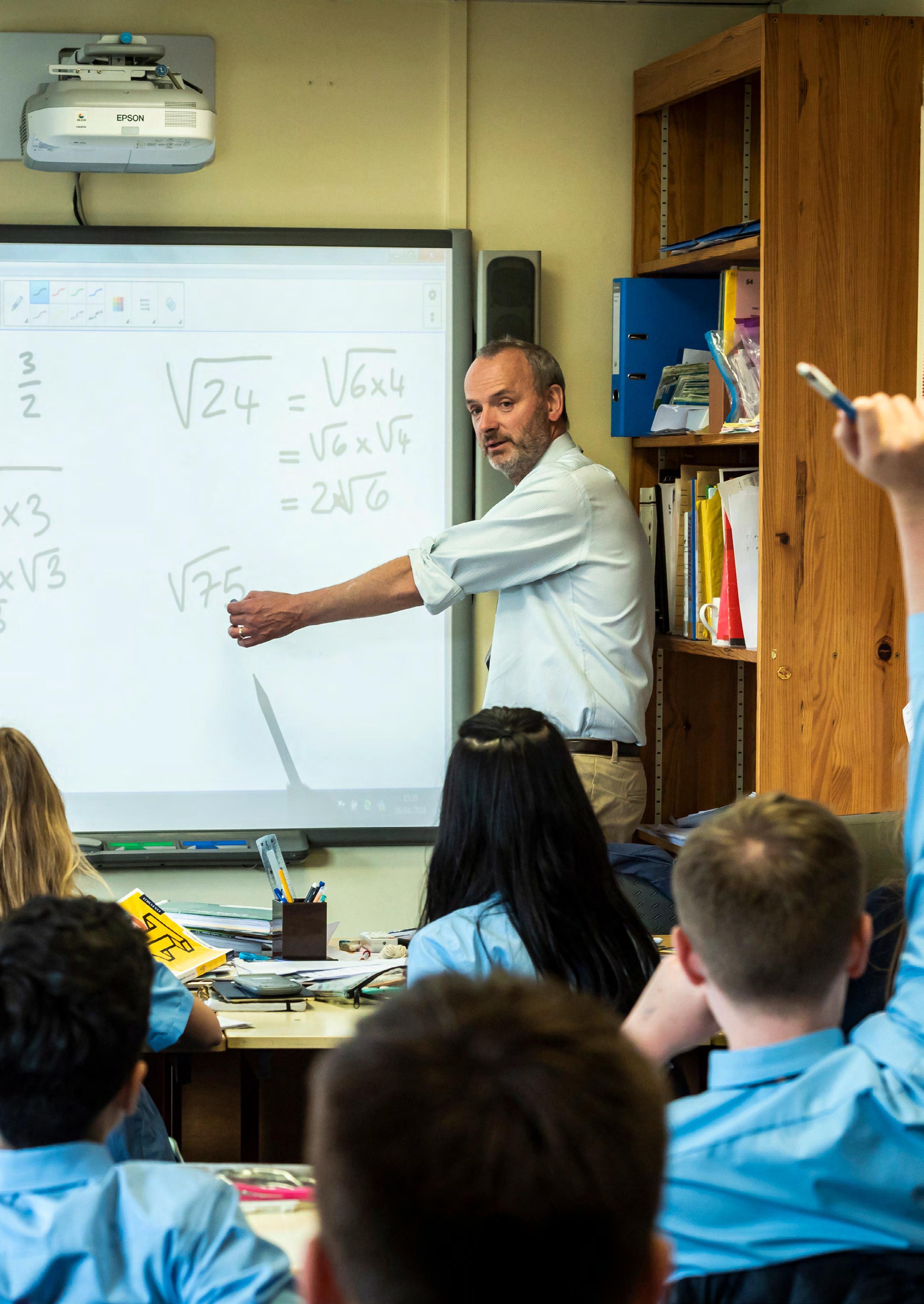


All language courses at The British School of Paris are based on the introduction, practice and acquisition of the four skill areas outlined by the National Curriculum:
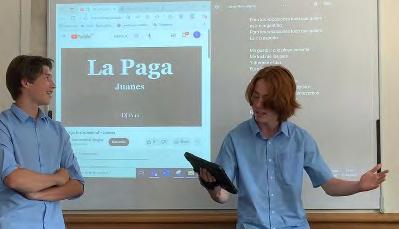
• Attainment Target 1 - Listening
• Attainment Target 2 - Speaking
• Attainment Target 3 - Reading
• Attainment Target 4 - Writing
The language content of our courses is chosen with the aim of exposing the pupils, throughout their Key Stage 3 teaching, to the five topic areas eventually examined at GCSE level:
• Identity and culture
• Local area, holiday and travel
• School
• Future aspirations, study and work
• International and global dimensions
Languages are taught in topic-based units which aim to cover a wide range of situations in appropriate settings for the purposes of practical communication in French, German or Spanish-speaking countries with a view to preparing the foundations for GCSE study. In Years 7 - 9 vocabulary acquisition and effective communication are
primary aims. Listening, speaking and basic reading skills are emphasised. Extended reading tasks and a study of language structure and grammatical points to enable accurate writing are introduced progressively throughout each course. The various cultures of French, German and Spanish speaking countries are also covered.
Teaching is conducted as much as possible in French, German or Spanish and pupils are encouraged to use the foreign language between themselves and when communicating with the teacher. Textbooks are often supplemented by more recent materials such as magazines and videos. We aim to make situations for language practice authentic and relevant.
Although much introductory work in the language classroom is undertaken by the teacher with the whole class, pupils are gradually encouraged to work individually, in pairs and in groups in order to foster the independent study skills necessary for GCSE and beyond.
All pupils study French from Year 7 to Year 11. In Year 7, pupils have the opportunity to study both German and Spanish (pupils switch language at the end of January) in order to be able to sample the two languages. This allows pupils to make an informed choice between German and Spanish for Year 8.
Year 7
• Personal introductions
• School life
• Free time
• Places in town and directions
• Holiday plans
• Media and new technology
• Exploring Paris
• Personal descriptions
• At home and meals
Year 8
• At home and meals
• France has got talent!
• World geography and French-speaking countries
• The French revolution
• Media and new technology
• Exploring Paris
• Personal descriptions
• Teenagers and their interests
Year 9
• Teenagers and their interests
• Sports and healthy eating
• Jobs and career plans for the future
• Holidays
• The world around us
• Identity and culture

GRAMMATICAL CONCEPT
• Present tense of regular and some common irregular verbs
• Adjectives and understanding agreement
• Possessive adjectives
• Partitive articles
• Using “on” to say “we”
• Understanding when to use “tu” and “vous”
• Modal verbs
• Prepositions
• Near future tense
• Perfect tense of regular and irregular verbs
• Reflexive verbs
• Near future tense
• Comparisons
• Present tense of regular and irregular verbs
• Perfect tense of regular and irregular verbs
• Adjectival agreement
• Reflexive verbs
• Near future tense
• Comparative adjectives
• Prepositions
• Modal verbs
• Imperative mood
• The perfect tense
• Direct object pronouns
• The perfect tense
• Direct object pronouns
• Relative pronouns
• Adverbs of frequency
• The imperfect tense
• Modal verbs
• The future tense
• Conditional mood
• Emphatic pronouns
• Expressions with “avoir”
• “Si” and complex sentences
• Reflexive verbs
• Depuis + present tense

There are several teaching groups for French in each year. Pupils are grouped as much as possible in homogeneous groups which reflect previous exposure and confidence with the language. Transfers will occur when teachers have consulted about the best timing for the pupils concerned. Flexibility is extremely important and these transfers can happen right up to the Summer Term if appropriate.
In each year there is one Special Objectives group. It is generally made up of pupils who have already had considerable exposure to French. This group will aim to take the GCSE examination one year early (i.e. at the end of Year 10) and will go on to begin preparation for A Level in Year 11.
With a developing emphasis on translation skills, the study of literacy texts and boosting the spontaneous use of French, we cover the following:
• Years 7, 8 and 9 – Set 2
• A selection of literary texts, poetry and films has been introduced to further challenge the pupils in Set 2.
• The curriculum also provides a study of the history of France linked with the texts chosen as well as with the Special Objectives programme whenever possible.
• In Years 7 and 8, pupils study two abridged novels (sometimes three, time allowing) and a film.
• In Year 9, pupils study either an abridged novel or a short novel and a film.
French Special Objectives groups are taught almost entirely in French and do not follow the same topics as other groups. The oral French of the Special Objectives groups is generally of a higher standard than their written French but although they are fluent in everyday idiom, pupils are often unable to appreciate the finer points of language and style. Grammar points are therefore emphasised at all stages. The teaching of grammar is both global and methodical: that is to say that the various grammatical points are taught as they occur in the texts the children study. The texts and films are carefully chosen to cover a range of styles, topics and vocabulary, and to stimulate the children’s interest and their desire to read further.
The cultural aspect is another essential element of the Special Objectives programme. A major part of developing reading and writing skills is based on the use of literary texts, poetry and films and on the study of the history and geography of France.
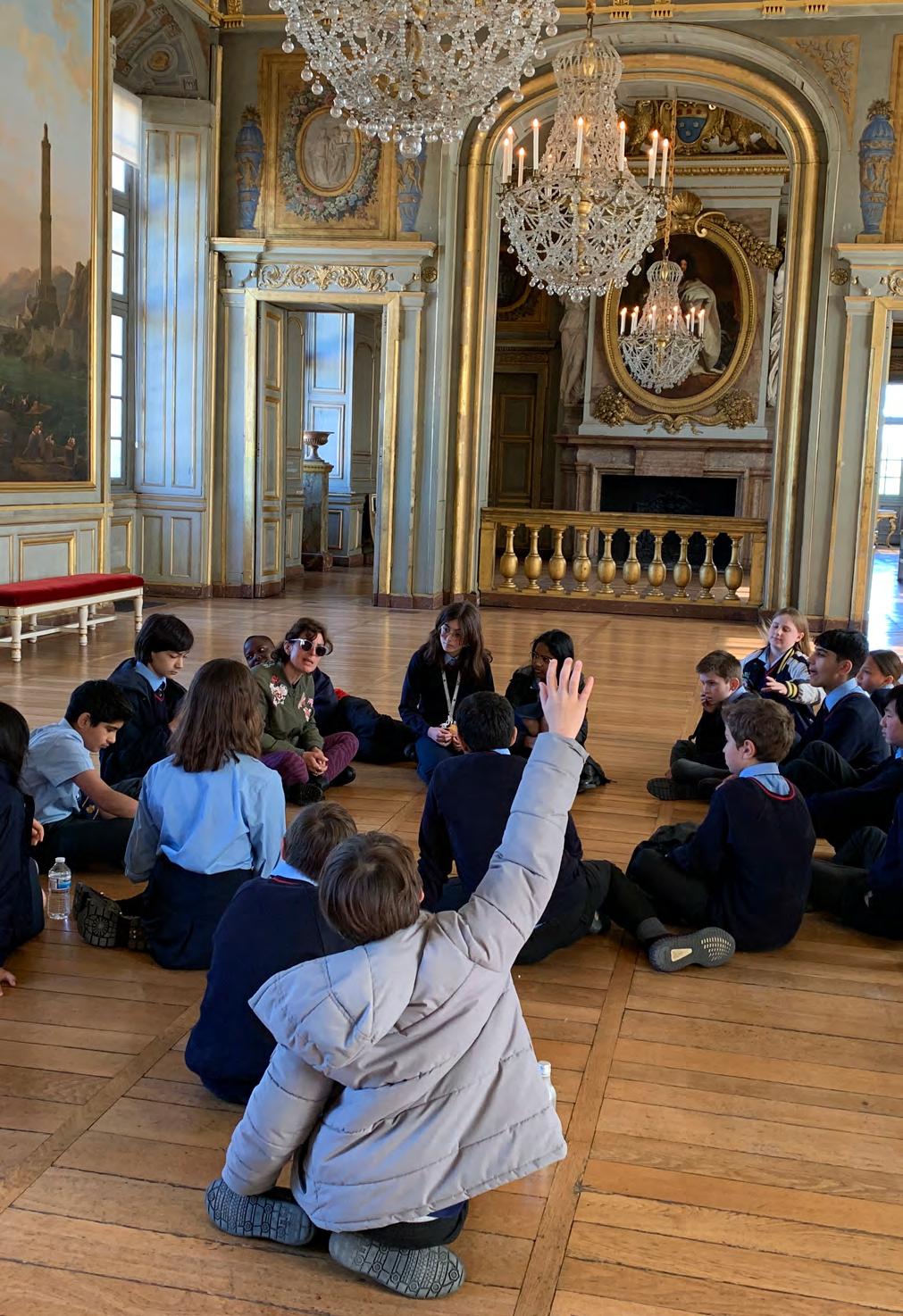
• In Year 7, pupils study contemporary and classic novels and a film.
• In Year 8, pupils study a play and/ or a novel as well as a film.
• In Year 9, pupils study a play, classic short stories and a film.
During the academic year, KS3 pupils have the opportunity to go on a trip. In the past, visits have been organised to the Château de Maisons, to the house of Alexandre Dumas in Port-Marly, to the Château de Malmaison as well as to the Château de Vaux-le-Vicomte.

In Years 7, 8 and 9 the four key skills of reading, writing, speaking and listening are emphasised.
The KS3 German Curriculum is exciting, creative, challenging and stimulating.
The main textbooks used are Echo Express 1 and Echo Express 2 but in addition, interactive whiteboard exercises, videos and language-specific websites are also used.
Grammar, translation, poetry and songs are also practised and the following topics are taught:
• Personal information
• School life
• My family
• Free time
• My town
• Holidays
• Media and technology
The German Department also runs a trip to Germany once every two years, if you opt to take German at GCSE. Past trips have been to Freiburg, Heidelberg and Aachen.
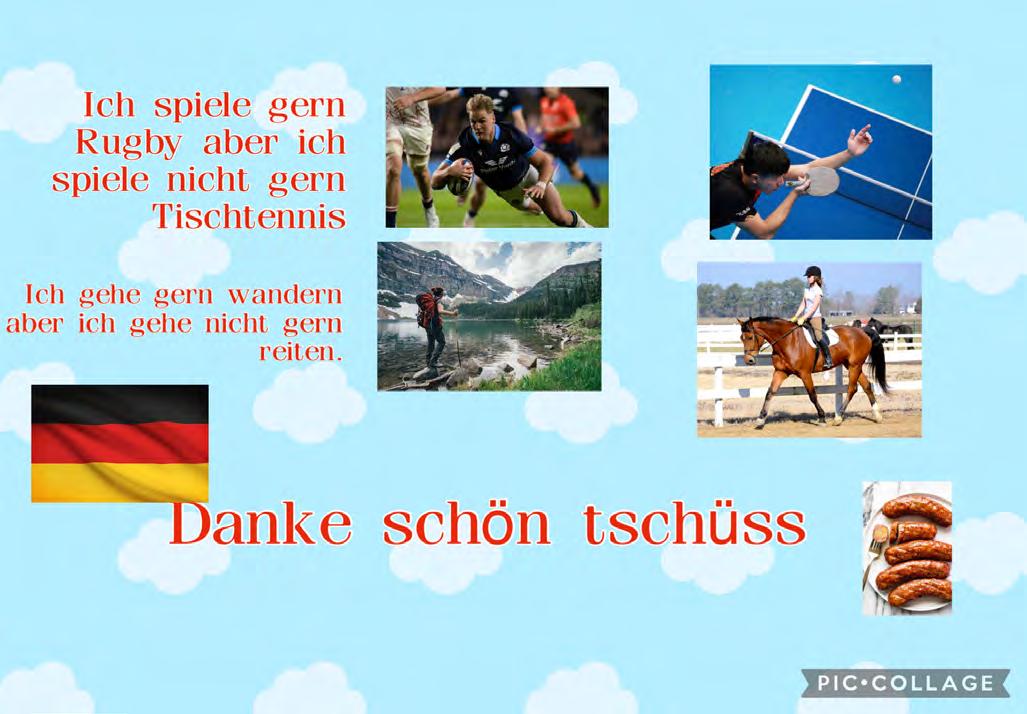
Our KS3 students begin their Spanish journey as complete beginners in Year 7.
Through a carefully designed three-year curriculum, we aim to instil a lifelong love for the Spanish language and build early confidence in its use. Students focus on acquiring a solid foundation in vocabulary and essential grammar in order to effectively communicate their messages. By the end of KS3, students will have mastered the basics and gained valuable cultural insights, equipping them with the skills to excel at GCSE and navigate real-life settings, such as travelling to Spanish-speaking countries.
The KS3 Spanish curriculum is designed to be progressive, creative, and stimulating, with a strong focus on developing all four language skills: listening, speaking, reading and writing. Through engaging projects, students are encouraged to take ownership of their learning by connecting the content to their interests, fostering both independence and a deeper understanding of the language. The Spanish Department is committed to nurturing curiosity about the world and promoting resourcefulness early on, helping students become confident communicators and self-reliant learners.
The main online textbooks used are Viva 1, 2 and 3 which can be accessed through Active Learn. The Spanish curriculum consists of interactive activities, iPad use and tailored resources based on the following cultural topics:
Personal information & description
• My family
• School life and opinions
• Home and Daily Routine
• Free time
• My town
• Holidays
• Food and Drink
• Leisure, Media & Technology
• Health
• Work
At KS3, students complete vocabulary and grammar tests, as well as end of unit tests routinely. These will usually cover a range of the four skill areas, however depending on the topic, one area may be particularly favoured.
Students are encouraged to reflect on and respond to feedback, while also familiarising themselves with the assessment codes for written work across all Key Stages in Spanish. This ensures they align with the success criteria and high standards of Spanish GCSE, facilitating a smoother transition and boosting their confidence. More importantly, it fosters resilience and a commitment to continuous improvement.
The Spanish Department arranges trips to Spanishspeaking countries for students who opt to study Spanish at GCSE level. Past trips have included visits to Granada and Madrid, with plans to expand future trips to South America in the coming years.

Music education has changed dramatically in schools in recent years and the Music department at The British School of Paris has moved forward positively, changing with the times. The most recent National Curriculum document is based on the two main strands of Performing/Composing and Listening /Appraising. Activities undertaken in class are based on this and provide students with a course of practical and active lessons.
In addition, the music centre offers extra-curricular activities so that students can expand their individual interests. There are opportunities for tuition in almost every instrument, including voice and opportunities to join the musical ensembles that exist in school.
The units covered are:
• The Elements of Music
• Classroom instruments
• Graphic scores & Spooky Music
• Instruments of the Orchestra
• Theory and traditional notation
• Music from Latin America
Classroom percussion instruments are used to explore the elements of music and for composition. The materials used are taken from a wide range of musical traditions and different types of musical notation are introduced. Singing and playing in parts is attempted and students are expected to perform solo and in a group in the classroom as part of the assessment process.
Students consider basic forms in music; the organisation of pitch, rhythm and timbre. They explore orchestral techniques, invent and perform their own music to others, notating it using appropriate signs, symbols and instructions.
Students listen to music from a broad range of traditions and historical periods, including music from around the world. They spend one half-term looking at the development of the modern symphony orchestra and its instruments. They attempt basic analysis and evaluation of music considering such elements as pitch, duration, timbre, pace, texture, dynamics and structure. The theory covered includes basic rhythm and pitch, and traditional notation.
Each year’s course is divided into several units. As work is completed it is marked and the results are used to help complete the requirements of the assessment process. Assessment is by observation, completion of set practical tasks which are recorded on the iPad and completion of written exercises.
The units covered are:
• Samba – Music from Brazil
• Exploring chords and bass in Reggae music
• Improvisation
• Going Solo
• Recording with the iPad
• Film Music soundtracks using Sibelius software
The instrumental pieces used in the classroom become more demanding, requiring wider knowledge of notation, more fluency and expression in performance of solo work and greater independence of parts in ensemble work.
Students are introduced to the electronic keyboard and are encouraged to use them for performance and as a tool for composition. Students are encouraged to write music for themselves and others, expressing their ideas and instructions in appropriate notation. Group performances are filmed on the iPad for assessment purposes. Students discover the technique of multi-tracking using the Garage Band app on the iPad, which leads into the teaching of Sibelius software in the classroom for the notation of their compositions and in the creation of a basic soundtrack for the Film Music unit at the end of the year.
The range of music presented to the students is increased with greater emphasis on 20th Century music and non-orchestral instruments. Analysis and evaluation continue with greater attention being paid to the use of specific musical vocabulary.
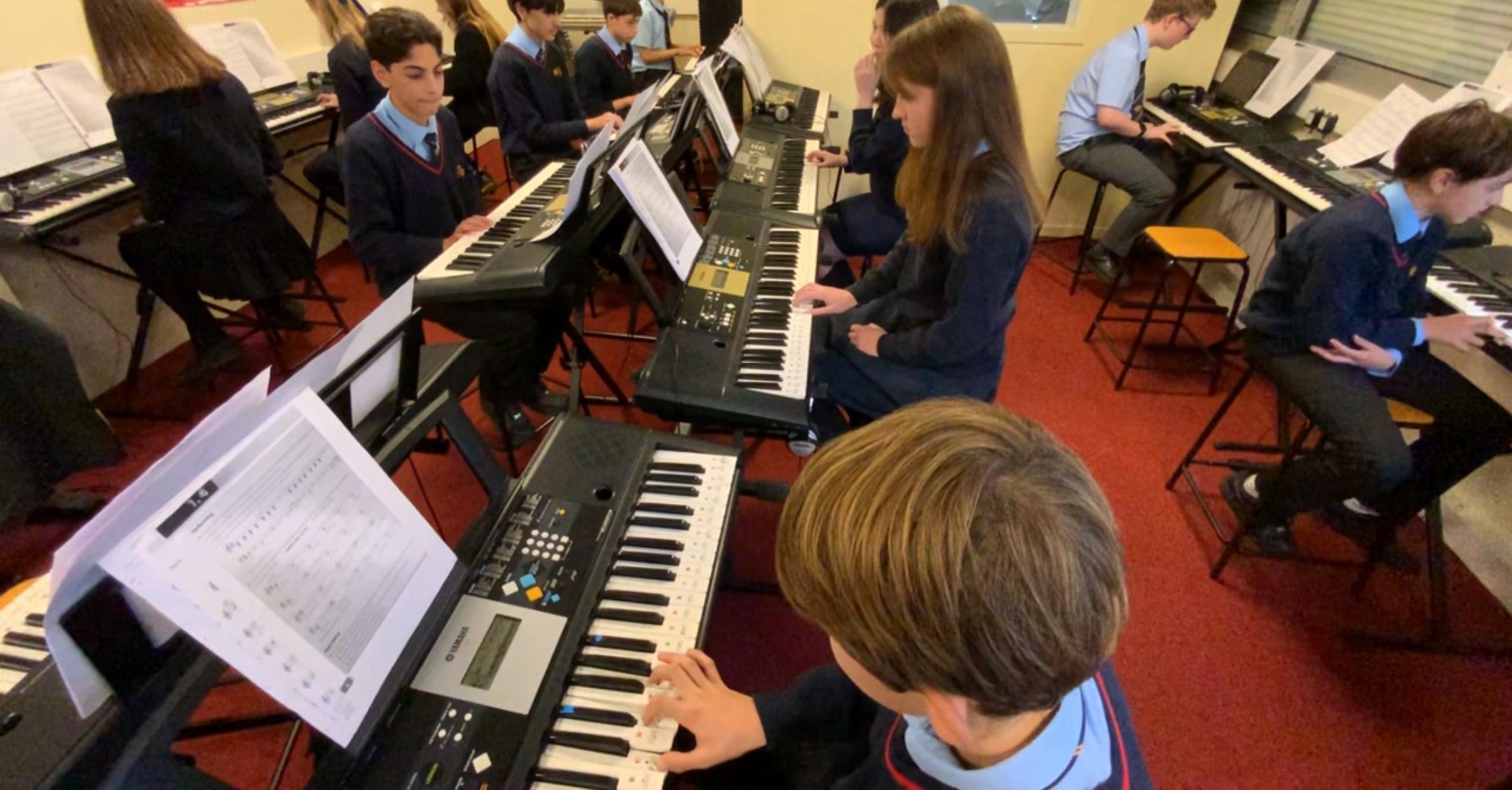
The units covered are:
• Chords into Jazz
• Improvisation and Organisation
• Ground Bass variations
• Making Arrangements
Students continue to have lessons using the electronic keyboards in the music suite’s custom-built studio. They work individually and in groups according to their experience. Students are encouraged to read melodies and chord symbols from printed music.
Work on classroom and orchestral instruments continues alongside keyboard work.
Students invent and notate music in popular styles with the aid of a keyboard. They also have access to computers and the Sibelius software. This can be used for creating, managing and storing student compositions. Final versions of students’ compositions are then performed and recorded onto the iPad as part of the assessment process.
To enable the compositions in this year to become more musically sophisticated, more advanced harmony, syncopation, transposition and arranging skills are taught.
The year ends with a whole year group competition where students consolidate their skills in the “Battle of the Bands”.
The listening programme is extended to include 20th Century music in all its forms, including commercial music. Analysis and evaluation of music is at a higher level than in Year 8 with listening activities similar in style to those at GCSE level.
Peripatetic teaching, Ens embles, the Associated Board of the Royal Schools of Music (ABRSM) and RSL Rock School Ltd.
Apart from classroom music we offer individual instrumental lessons in school on most instruments and these are arranged through the Head of Music.
The main school ensembles are Orchestra, Choir and the Jazz Band. These groups meet weekly to rehearse and perform at all manner of concerts. Choir membership is by sign-up during the Thursday Activities sessions, and Orchestra is open to allon a Tuesday lunchtime. Students receiving instrumental tuition in the school day are strongly encouraged to be involved in the orchestra or choir.
Other ensembles are drawn from the open ensembles to prepare more demanding group pieces.
The British School of Paris is the centre for the ABRSM in France. The practical and theory examinations are offered once a year in a face-to-face setting, and throughout the year “on demand” in a virtual, digital submission format. Results across the two formats are excellent with many distinction and merit grades being obtained.
The school has also hosted Rockschool exams in the past but, as with the ABRSM, most of these exams are now in a virtual, digital format where students can prepare and record their video for submission at almost any time during the year. Students are examined on drums, electric guitar, keyboards and vocals.

The Physical Education department aims to provide a bespoke, balanced and varied programme which will enable each pupil, as far as possible, to be proficient in several physical activities including football, touch rugby, netball, handball, indoor cricket, unihoc, badminton, fitness, table tennis, orienteering, climbing, basketball, ultimate frisbee, rounders and athletics.
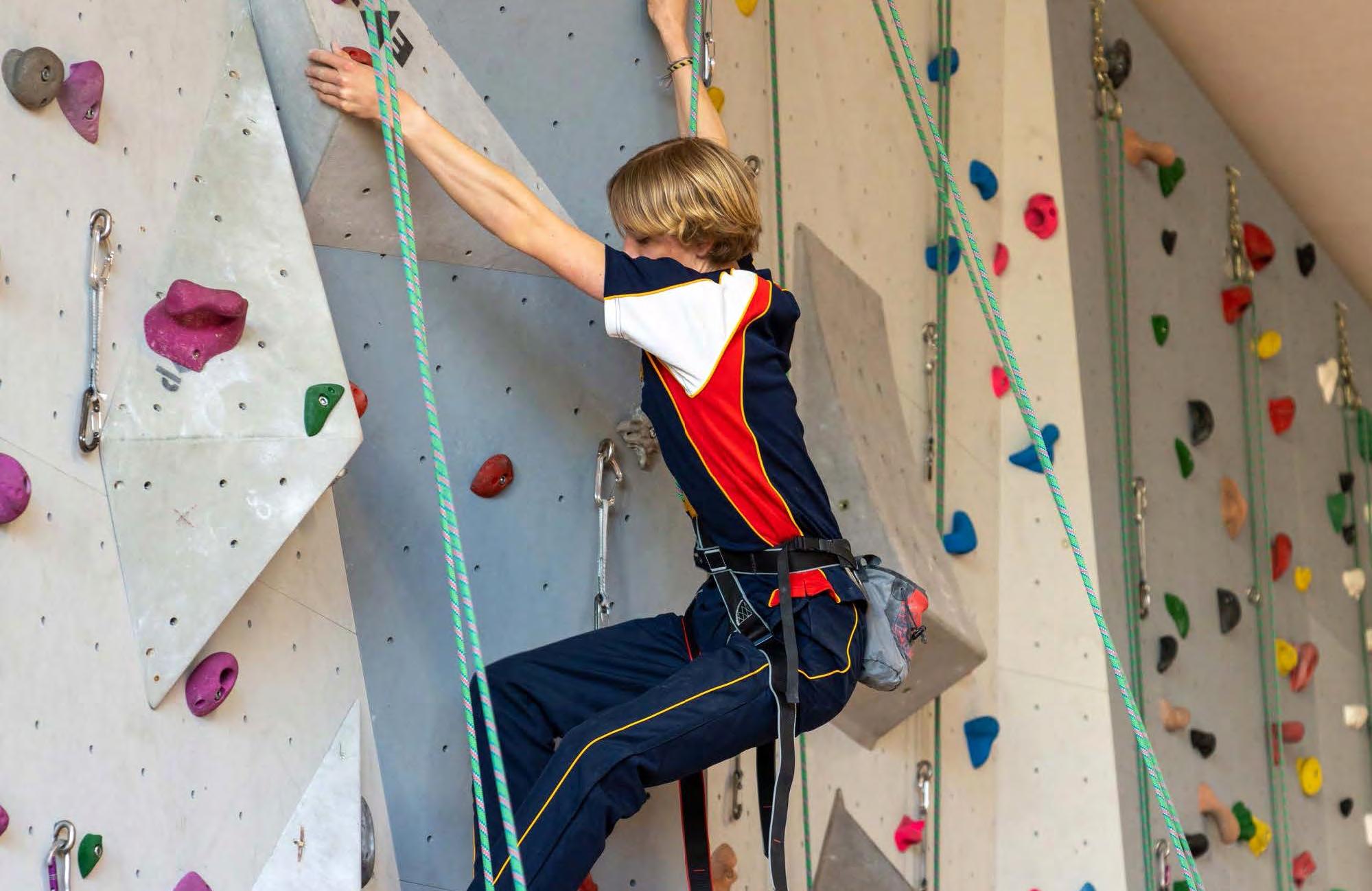
The pupils have one hour of Physical Education each week which is taught within their tutor groups and the lessons are therefore mixed ability and mixed gender. Physical Education lessons are mainly concerned with indoor sports as well as specific health-related activities.
Pupils also have an hour of sport lessons that focus on larger team sports although there are various other activities available. Within the Sport lessons, pupils are given the opportunity to choose activities from options blocks each half term. This creates a more bespoke learning experience for pupils, as they will be involved in the sports that afford them the most motivation. Sports groups are of mixed gender and mixed ability, although for large groups pupils may be set in levels of ability. There is always the possibility of movement between these groups, and this will depend upon the pupil’s attainment within specific activity.
The department concerns itself with achieving success in the following areas:
• Enjoyment and satisfaction
• Physical development
• Acquisition of motor skills
• Self-expression/aesthetic appreciation
• Social training
• Education for leisure
Regular assessment records each pupil’s progress over the year. As Physical Education is aimed at educating the pupils both ‘in’ and ‘through’ the physical, assessment within the department will not only record the pupils’ abilities but also their motivation, their ability to work with others, their ability to lead and organise, along with a basic knowledge and understanding of how to maintain a healthy, active lifestyle.

The Department for Education (DfE) calls PSHE education ‘an important and necessary part of all pupils’ education’ and maintains that ‘all schools should teach PSHE, drawing on good practice’.
A DfE evidence review highlighted the subject’s importance to children and young people’s wellbeing and knock-on effects on academic achievement, stating that ‘The evidence shows that personal, social, health and economic (PSHE) education can improve the physical and psychosocial well-being of pupils. A virtuous cycle can be achieved, whereby pupils with better health and well-being can achieve better academically, which in turn leads to greater successes.’
The health and well-being core theme of PSHE education teaches knowledge and skills related to healthy lifestyles, including food choices, exercise, sleep and dental health; mental health; drugs and alcohol; first aid and emergency life-saving skills; sexual health and fertility; managing risk and personal safety. This education directly helps
Year 7 Living in a wider world
• Personal and community values
• Setting and achieving goals
• Respecting cultural and religious differences
• The online world (behaviour rules, risks, social media)
• Community project: Toilet Twinning Initiative
Year 8 Living in a wider world
• Digital literacy
• Introduction to careers
• Financial literacy
• Community project: Challenging Heights
Year 9
Living in a wider world
• Setting goals: learning strengths, career options and goal setting
• Debating skills
• Habits and strategies to support progress
• United Nations
• Community project: Ellsa
Relationships
• Self-worth
children to be mentally and physically healthy, which in turn supports their education outcomes (research evidence shows that educational outcomes and health are closely linked (Public Health England, 2014)).
The pupils are encouraged to develop:
• a healthy and safe lifestyle
• good relationships while respecting the differences between people
• skills of enquiry and communication
• methodical and successful work habits
• ways of living independently in the wider world
The programme for Years 7-9 remains flexible and responsive to changing needs but includes the following areas:
• Managing different types of relationships (romance and friendship, including online) and conflict
• Relationships boundaries (introduction to consent)
• Gender stereotypes and differences
Relationships and sexual education
• Identity and relationships: sexual orientation, consent, introduction to contraception
• Discrimination in all its forms: how to create healthy relationships, relationship values
Relationships and sexual education
• Healthy intimate relationships
• Safer online relationships, the risks of sharing online images
• Relationships in the media and pornography
Health and well-being
• Transition to secondary school
• Healthy routines, influences on health, puberty and emotional changes, unwanted contact
• Mental health and emotional wellbeing
• Outdoor education week preparation
Health and well-being
• Getting ready for the new year ahead: helping others, selfefficacy and making mistakes
• Stress and anxiety management,
• Mental health and emotional wellbeing,
• Recognising and getting help for issues
Health and well-being
• Revision techniques and study skills
• Healthy lifestyle: diet, exercise, healthy choices,
• Peer influence and substance use
• Outdoor education week preparation
Please note that you should contact the school (ssc@britishschool.fr) if you have any queries about content or resources for specific topics.

The Science programme studied at The British School of Paris in Years 7, 8 and 9 follows the National Curriculum of England and Wales. Pupils transferring from the UK will integrate seamlessly into our programme of study at KS3. It is also our experience that the subject matter agrees well with science programmes all around the world since its broad base covers nearly all the essential scientific skills, knowledge and understanding typical for this age.
A high-quality science education provides the foundations for understanding the world through the specific disciplines of Biology, Chemistry and Physics. Science has changed our lives and is vital to the world’s future prosperity, and all pupils should be taught essential aspects of the knowledge, methods, processes and uses of science.
By building up key knowledge and concepts, pupils should be encouraged to recognise the power of rational explanation and develop a sense of excitement and curiosity about natural phenomena. They should be encouraged to understand how science can be used to explain what is occurring, predict how things will behave and analyse causes.
The British School of Paris programme of study at Key Stage 3 aims to ensure that all pupils:
• Develop scientific knowledge and conceptual understanding through the specific disciplines of Biology, Chemistry and Physics.
• Develop understanding of the nature, processes and methods of science through different types of science enquiries that help them to answer scientific questions about the world around them.
• Are equipped with the scientific knowledge required to understand the uses and implications of science, today and for the future.
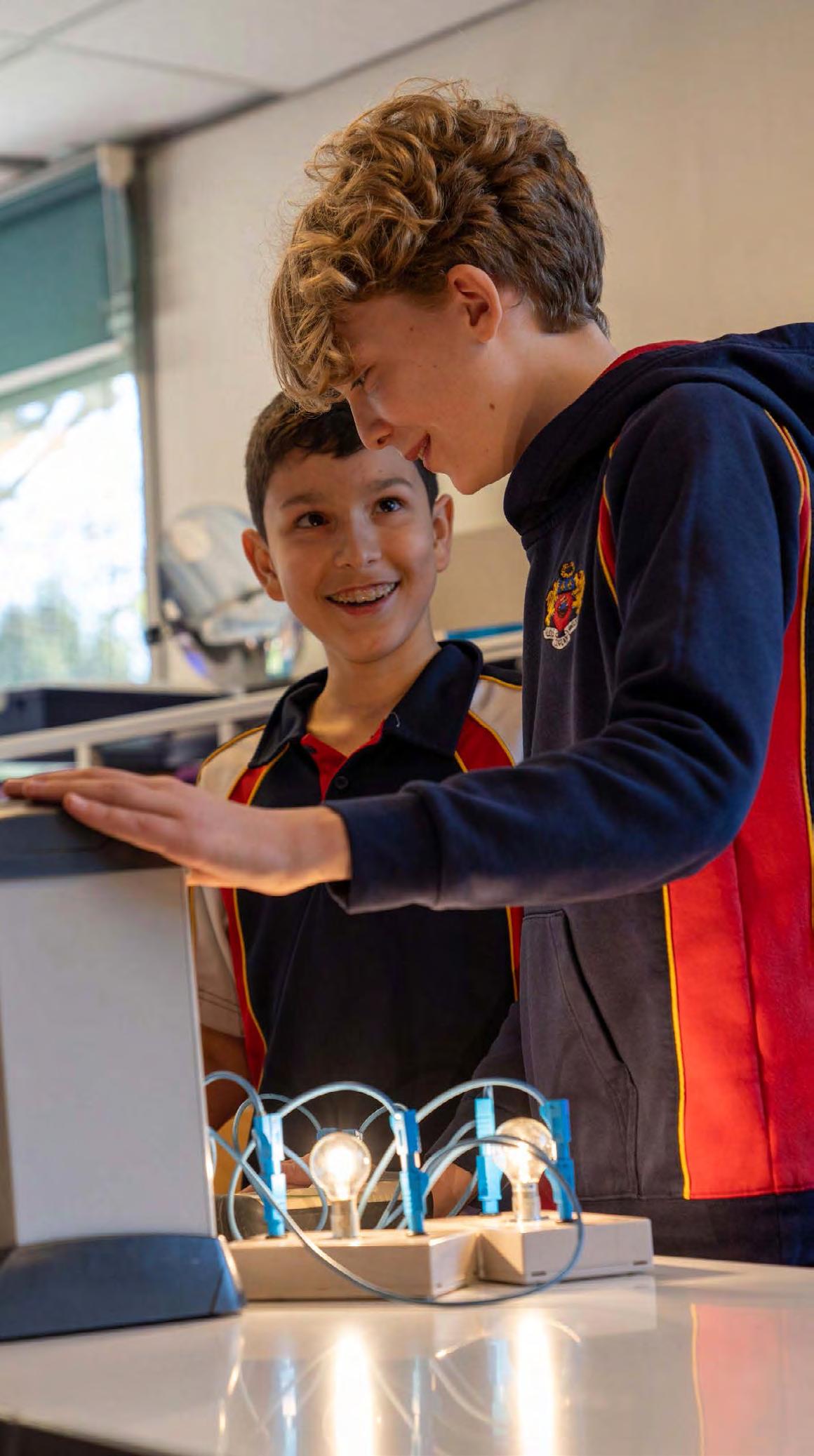

Key processes
• Practical skills
• Citical understanding of evidence
• Communication
Curriculum opportunities
• Research, experiment, discuss and develop arguments
• Study science in local, national and global contexts
• Experience science outside the school environment
• Use creativity and innovation in science and appreciate their importance in enterprise
• Prepare to specialise in a range of science subjects at Key Stage 4 and consider career opportunities both within science and in other areas that are provided by scientific qualifications
• Make links between science and other subjects and areas of the curriculum
To deliver this curriculum we follow a scheme of work laid out by the Department for Education. All pupils will have access to an electronic textbook on their iPad via the Kerboodle website.
Experimental work is a vital and exciting part of scientific education and at The British School of Paris we use every opportunity to perform experiments as a basis for both discovery and reinforcement of concepts and ideas. It is a rare week if a pupil in Years 7, 8 and 9 has not been involved in practical work, although this does depend on the topic being studied. Communication skills, whether through writing up experiments or engaging in class discussions, are also essential for any scientist. Pupils are always encouraged to express their ideas, theories and creative thought. We also provide opportunities for pupils to incorporate Information Technology into their scientific work especially in the collection and analysis of data.
By the end of Year 9, those pupils who attend The British School of Paris from Year 7 will have studied the entire KS3 Programme of Study; they will also have laid firm foundations for the GCSE courses ahead. We feel we will have succeeded if they have also enjoyed this experience and are able to apply their skills and knowledge to further their development as members of society.
Lessons are divided into two timetabled classes as Science 1 and Science 2, where each is taught by a separate teacher.
In Science 1 lessons the Biology topics listed below are covered as well as half of the Chemistry topics. Science 2 lessons cover the remaining Chemistry topics as well as the Physics topics.
The following table gives an outline of the topics covered in each year of the course:
Year 7
• Biology 1 and 2 –Living Systems
• Biology 3 and 4 –Reproduction and Growth
• Chemistry 1 and 2 – The Particulate Nature of Matter
• Chemistry 3 and 4 – Acids, Alkalis and Neutralisation
• Physics 1 and 2 –Motion and Forces
• Physics 3 and 4 – The Solar System and the Universe
Year 8
Year 9
• Biology 5 and 6 –Diet and Health
• Biology 7 and 8 – Ecosystems
• Chemistry 5 and 6 – Atoms, Elements and Compounds
• Chemistry 7 and 8 – The Earth and the Atmosphere
• Physics 5 and 6 – Energy and Energy Resources
• Physics 7 and 8 - Electricity and Magnetism
• Biology 9 and 10 –Genetics and Evolution
• Biology 11, 12 and 13 –Photosynthesis, Respiration and Circulation
• Chemistry 9 and 10 – Reactions
• Chemistry 11 – Materials and Everyday Chemistry
• Physics 9 – Levers, Moments and Pressure
• Physics 10 and 11 – Waves


